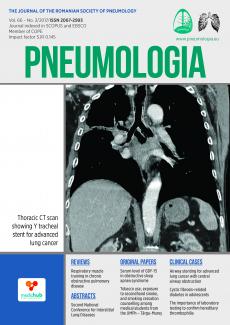REVIEWS FOR CLINICAL PRACTICE
Non-pharmacological approach of bronchiectasis – the results of respiratory rehabilitation in two clinical cases
Elena Danteș, Alina Croitoru, Daniela Jipa, Alina Baciu, Doina TodeaNon-pharmacological approach of bronchiectasis – the results of respiratory rehabilitation in two clinical cases Background. Respiratory rehabilitation (RR) represents an important part of bronchiectasis therapeutic management. The aim of our paper is to present two cases of patients with bronchiectasis who participated in a RR program and, based on this experience, to describe a respiratory rehabilitation protocol for bronchiectasis.
Case 1: A 66-year-old male, with left lower lobe cystic bronchiectasis and many infectious exacerbations, who entered in a 4-week respiratory rehabilitation program mainly based on physical training, respiratory physiotherapy and aerosol therapy, nutritional support and psychological counseling. The RR program brings benefits in terms of symptoms (cough, bronchial secretions) and the number of infectious exacerbations in the next year following the rehabilitation.
Case 2: A 32-year-old male, diagnosed with cystic fibrosis, with severe obstructive respiratory dysfunction, chronic respiratory failure and cachexia. He benefited from an inpatient individualized rehabilitation program with aerosol therapy, respiratory physiotherapy, physical training, cough correction, breathing reeducation and high protein intake, with positive effects: reducing dyspnea, decreased amount of sputum and clarifying its appearance, better effort tolerance, and overall improved quality of life.
Conclusions. The respiratory rehabilitation can be successful when used in this type of patients. The RR program is multidisciplinary - airway clearance techniques, aerosol therapy, muscular training, nutritional support, psychological counselling, and therapeutic education - and must be adapted to each patient's needs.




 Non-pharmacological approach of bronchiectasis – the results of respiratory rehabilitation in two clinical cases
Non-pharmacological approach of bronchiectasis – the results of respiratory rehabilitation in two clinical cases